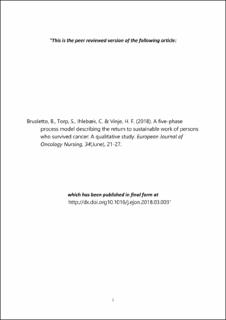A five-phase process model describing the return to sustainable work of persons who survived cancer: A qualitative study
Peer reviewed, Journal article
Accepted version
Permanent lenke
https://hdl.handle.net/11250/2649673Utgivelsesdato
2018Metadata
Vis full innførselSamlinger
Originalversjon
European Journal of Oncology Nursing. 2018, 34 (June), 21-27. 10.1016/j.ejon.2018.03.003Sammendrag
Abstract Purpose We investigated persons who survived cancer (PSC) and their experiences in returning to sustainable work. Methods Videotaped, qualitative, in-depth interviews with previous cancer patients were analyzed directly using “Interpretative Phenomenological Analysis” (IPA). Four men and four women aged 42–59 years participated. Mean time since last treatment was nine years. All participants had worked for more than 3 years when interviewed. An advisory team of seven members with diverse cancer experiences contributed as co-researchers. Results The entire trajectory from cancer diagnosis until achievement of sustainable work was analog to a journey, and a process model comprising five phases was developed, including personal situations, treatments, and work issues. The theme “return-to-work” (RTW) turned out to be difficult to separate from the entire journey that started at the time of diagnosis. PSCs were mainly concerned about fighting for life in phases 1 and 2. In phase 3 and 4, some participants had to adjust and make changes at work more than once over a period of 1–10 years before reaching sustainable work in phase 5. Overall, the ability to adapt to new circumstances, take advantage of emerging opportunities, and finding meaningful occupational activities were crucial. Conclusions Our process model may be useful as a tool when discussing the future working life of PSCs. Every individual's journey towards sustainable work was unique, and contained distinct and long-lasting efforts and difficulties. The first attempt to RTW after cancer may not be persistent.
